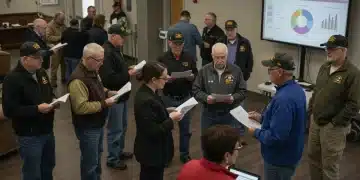Housing assistance for disabled veterans: know your options

Housing assistance for disabled veterans includes programs like VA home loans, Specially Adapted Housing grants, and HUD-VASH vouchers, designed to provide essential support in securing safe and affordable housing.
If you’re a veteran facing disability challenges, accessing housing assistance for disabled veterans can be a game-changer. This support can significantly ease daily struggles and offer a safer, more comfortable living environment. Let’s dive into how you can navigate these important resources.
Understanding housing assistance programs
Understanding housing assistance programs can feel overwhelming, but it’s essential for veterans seeking support. These programs are designed to help you find safe and affordable housing options tailored to your needs.
Types of Programs Available
There are multiple housing assistance programs specifically for veterans. Knowing which one suits your situation is crucial. Here are some key programs:
- VA Home Loan Benefits: With this program, you can secure a loan with favorable terms to purchase a home.
- Grant Programs: Options like the Specially Adapted Housing (SAH) grant assist veterans in modifying homes to better suit their disabilities.
- Supportive Housing Programs: Programs such as HUD-VASH combine housing vouchers with supportive services for homeless veterans.
Each program operates slightly differently, so it’s vital to explore them based on your circumstances. For instance, the VA home loan benefits allow veterans to avoid private mortgage insurance, making it easier to buy a home.
Eligibility Criteria
Eligibility for these programs often depends on several factors, including military discharge status and the nature of your disability. It’s essential to gather the necessary documentation, like your DD Form 214 and medical records.
Once you know your eligibility, you can begin the application process. This step can be daunting, but local Veteran Service Organizations (VSOs) provide free help.
Understanding these housing assistance programs and their benefits is vital to secure a better life. By researching and utilizing available resources, disabled veterans can find the financial support they need to thrive in their homes.
Eligibility criteria for disabled veterans
Understanding the eligibility criteria for disabled veterans is crucial for accessing housing assistance programs. Different programs have their own specific requirements, making it essential to know what applies to you.
General Eligibility Requirements
To be eligible for most housing assistance, veterans typically need to meet certain conditions. These may include:
- Service-Connected Disability: You must have a disability that is connected to your military service.
- Discharge Status: A honorable discharge from the military is usually required.
- Income Limits: Many programs have income limits that vary according to local guidelines.
These criteria often vary between programs, so it’s important to check the specifics. For example, the VA may have different standards compared to HUD programs.
Documentation Needed
Gathering the right documentation is vital for a smooth application process. You will generally need:
- Your DD Form 214, which shows your discharge status.
- Medical records confirming your disability.
- Proof of income, such as pay stubs or tax returns.
Having these documents ready can significantly speed up your application. Additionally, local Veteran Service Organizations (VSOs) can help you navigate through the eligibility requirements.
Being well-informed about your eligibility criteria enhances your chances of receiving the support you need. Don’t hesitate to seek help from resources available to veterans.
Types of housing assistance available

There are various types of housing assistance available for disabled veterans, each designed to meet unique needs and circumstances. Understanding these options can help you find the appropriate support.
VA Home Loan Benefits
The VA home loan program is one of the most popular options. It enables veterans to buy homes with favorable terms, such as no down payment and no private mortgage insurance. This program also allows veterans to refinance their existing loans to secure better rates.
Specially Adapted Housing Grants
The Specially Adapted Housing (SAH) grant is designed to help veterans with certain service-connected disabilities. This grant can provide funding to build or modify a home to meet accessibility needs. This could involve installing ramps, widening doorways, or making other adjustments to improve mobility.
HUD-VASH Program
The HUD-VASH program combines housing vouchers from the U.S. Department of Housing and Urban Development (HUD) with supportive services from Veterans Affairs. This program aims to reduce homelessness among veterans. It offers a range of assistance to help veterans secure permanent housing while providing resources for rehabilitation and recovery.
Transitional Housing Programs
Transitional housing programs are temporary arrangements designed to help veterans who are homeless or at risk of homelessness. These programs often offer a stable environment where veterans can receive support services, work on job skills, and find permanent housing. They are crucial for aiding veterans in their journey towards stability.
Overall, the options for housing assistance can provide essential support for veterans. By exploring these different types, disabled veterans can make informed decisions that best fit their needs and circumstances.
Steps to apply for housing benefits
Knowing the steps to apply for housing benefits can simplify the process for disabled veterans. Applying for these benefits might seem complicated, but breaking it down into clear steps can help.
Step 1: Gather Required Documents
The first step in applying is to collect necessary documentation. This typically includes:
- Your DD Form 214, which shows your military service.
- Medical records that confirm your disability status.
- Proof of income and financial documentation.
Having these documents organized will make the application process smoother.
Step 2: Determine Eligibility
Once you have your documents, check the specific eligibility criteria for the program you are interested in. Each housing assistance program has its own set of requirements. Some may require you to meet income limits or specific disability ratings.
Step 3: Complete the Application
Next, proceed to fill out the application form. This can often be done online, but paper forms are also available. Be sure to provide accurate and complete information to avoid delays in processing.
Step 4: Submit the Application
After completing the application, submit it along with all required documentation. Keep a copy of everything you send for your records. If you apply online, follow up to ensure that your application was received.
Step 5: Await Response
After submission, you will need to wait for a response. Processing times may vary, so be patient. You can contact the agency to check the status of your application if you face delays.
Understanding these steps for applying helps ease the stress associated with the application process. Always remember that local Veteran Service Organizations can offer support and guidance if you run into any challenges.
Resources for ongoing support and advocacy
Finding resources for ongoing support and advocacy is essential for disabled veterans seeking help with housing and other needs. These resources can provide guidance, emotional support, and practical assistance.
Veteran Service Organizations (VSOs)
Organizations like the American Legion, Disabled American Veterans (DAV), and Veterans of Foreign Wars (VFW) offer support to veterans. They can help connect you with benefits, resources, and advocacy services. VSOs often have dedicated staff who understand the challenges veterans face.
Legal Assistance
Legal aid services can also be valuable. They help veterans navigate issues related to benefits and housing discrimination. Many VSOs provide free legal assistance or can refer you to specialized attorneys.
Government Agencies
The U.S. Department of Veterans Affairs (VA) is a crucial resource. The VA’s websites have information on housing assistance programs, healthcare, and disability benefits. You can also visit local VA offices for in-person assistance.
Online Support Groups
Online forums and support groups can be a great way to connect with others who understand your situation. Websites like RallyPoint or Veterans’ Facebook groups allow veterans to share experiences and provide support.
In addition to these resources, many local communities have programs and organizations that offer support for veterans. Reaching out to local resources can open doors to help and advocacy. Remember that you are not alone, and there are many avenues available to assist you in your journey.
FAQ – Housing Assistance for Disabled Veterans
What types of housing assistance are available for disabled veterans?
Disabled veterans can access programs like VA home loans, Specially Adapted Housing grants, and HUD-VASH vouchers to help with housing.
What are the eligibility criteria to apply for housing benefits?
Eligibility typically requires a service-connected disability, honorable discharge, and often an income limit depending on the program.
How do I apply for housing assistance as a disabled veteran?
Gather necessary documents, determine your eligibility, complete the application, and submit it to the respective agency for processing.
Where can I find ongoing support and advocacy for housing assistance?
Veteran Service Organizations, government agencies, and online support groups provide valuable resources and advocacy for disabled veterans seeking housing assistance.





